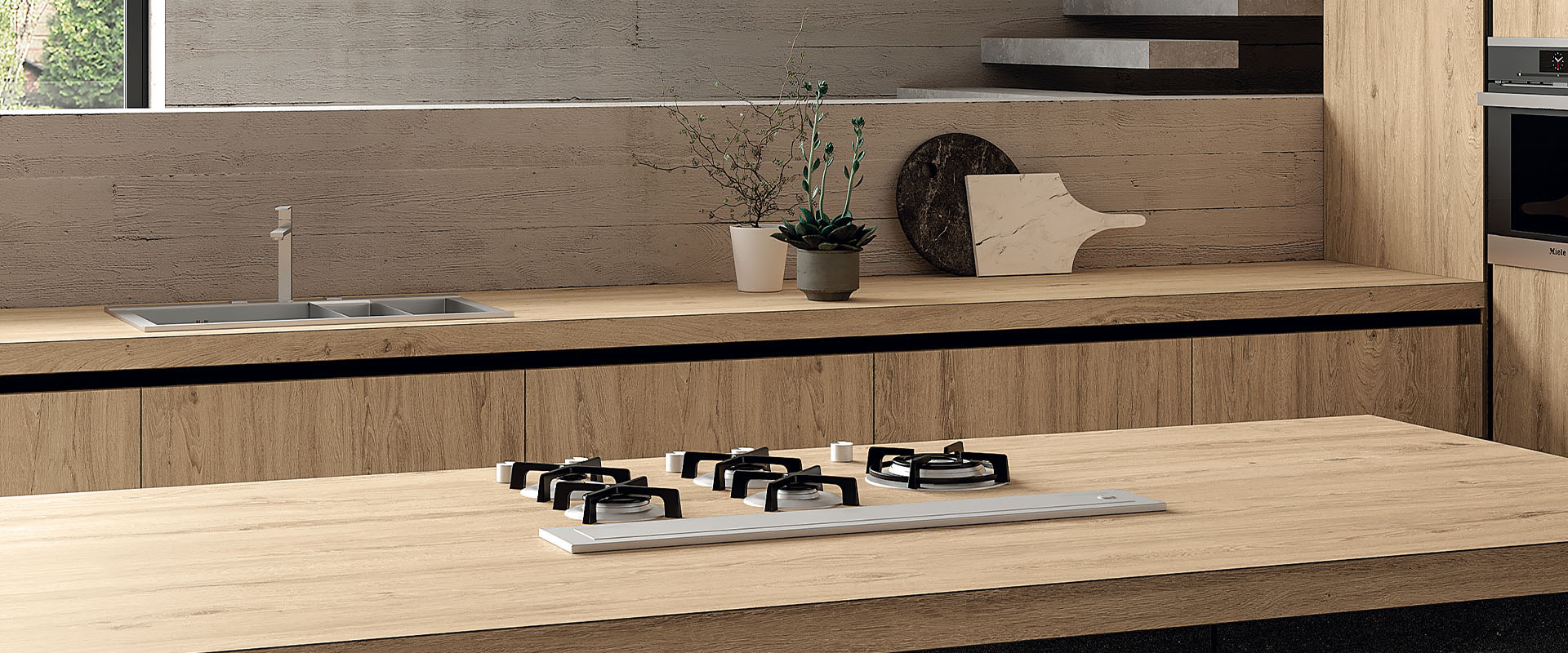
The two most popular materials for kitchen worktops today are porcelain stoneware and wood.
Choosing a material is often a matter of personal preference, but also depends on the preferred design style and required performance.
Learning more about the characteristics of each material allows consumers to make informed choices, so that their kitchen not only reflects their personal taste, but is also functional and long-lasting.
As a result of increased environmental awareness, the demand for sustainable materials is on the rise – also in the field of interior design.
Wood and stoneware have a very different impact on the environment.
Factors affecting the sustainability of wood include forest management practices, production processes and the life cycle of materials.
The production of wood for the industry leads to deforestation and loss of biodiversity, while the processing of wood may require the use of chemicals that are harmful to human health and the environment.
Wooden worktops for kitchens require regular maintenance in order to maintain their beauty and longevity.
If not properly treated or maintained, wood can degrade more quickly than other more durable materials, such as natural ceramics: in fact, this material does not need to be replaced or maintained as often as others and is more long-lasting.
On the other hand, porcelain stoneware (natural ceramics) is a sustainable material, as it is mainly composed of natural resources such as clay, silica and feldspar, which are abundant on our planet.
Stoneware is known to be a highly resistant, durable and recyclable material, so it can be recovered and reused in the manufacturing process, promoting a more efficient circular economy of materials.
Materials such as wood and stoneware have unique characteristics that affect the look and functionality of a work surface.
Let’s examine the distinguishing features of both materials in more detail.
Wooden kitchen worktops are prized for their warm and natural look, rustic and sophisticated at the same time.
But what about the fact that they are not very environmentally sustainable?
The appearance of wood, with its distinctive grains and shades, can be accurately and realistically reproduced on ceramic surfaces.
With a large variety of design options and a choice of smooth or polished finishes, wood-effect porcelain stoneware worktops give you the look you want without the maintenance problems associated with wood.
In order to ensure durability, wooden surfaces require proper treatment.
They are highly susceptible to moisture, insects and scratches, and require periodic maintenance.
Additionally, prolonged exposure to direct sunlight may result in colour fading or changing.
Porcelain stoneware, on the other hand, is resistant to impact, stains and heat.
It is also highly resistant to the sun’s rays and chemicals, making it ideal for intensive use and suitable for use both indoors and outdoors.
In order to preserve the beauty of wood, it is essential to clean it regularly, take good care of it, and use gentle products.
With its smooth, non-porous surface, stoneware is a hygienic option, as it is less likely to absorb bacteria or odours.
Kitchen work surfaces that have self-cleaning and self-polishing properties are now available on the market, thanks to cutting-edge technologies such as Active Surfaces® by SapienStone, ensuring:
Considering parameters such as durability, sustainability, and the maintenance requirements outlined so far, porcelain stoneware is the material that is best suited to meeting the needs of today’s kitchens.
Available in a wide range of textured effects that accurately replicate natural materials such as wood, ceramics are an excellent choice because they are durable, easy to maintain and practical.
SapienStone specialises in the production and marketing of porcelain stoneware kitchen worktops for residential and commercial use, offering cutting-edge performance in terms of technical properties and aesthetics.
Full-body technology, 4D Ceramics and large formats (160x320 mm) are the hallmarks of this brand, which is part of Iris Ceramica Group.
For those who love the warm tones and cosy feel of wood, SapienStone offers surfaces with realistic textures that are designed to replicate the natural look of wood:
These ceramic surfaces are a more durable and low-maintenance alternative to wood, as they retain their original shape over time, while still maintaining an elegant and sophisticated look.
Cutting-edge production technologies give surfaces an authentic tactile feel: discover all the available finishes.
Would you like to incorporate a wood-effect porcelain stoneware work surface into your interior design project? Check out our ideas on how to combine it with a marble effect and please feel free to contact us for advice.